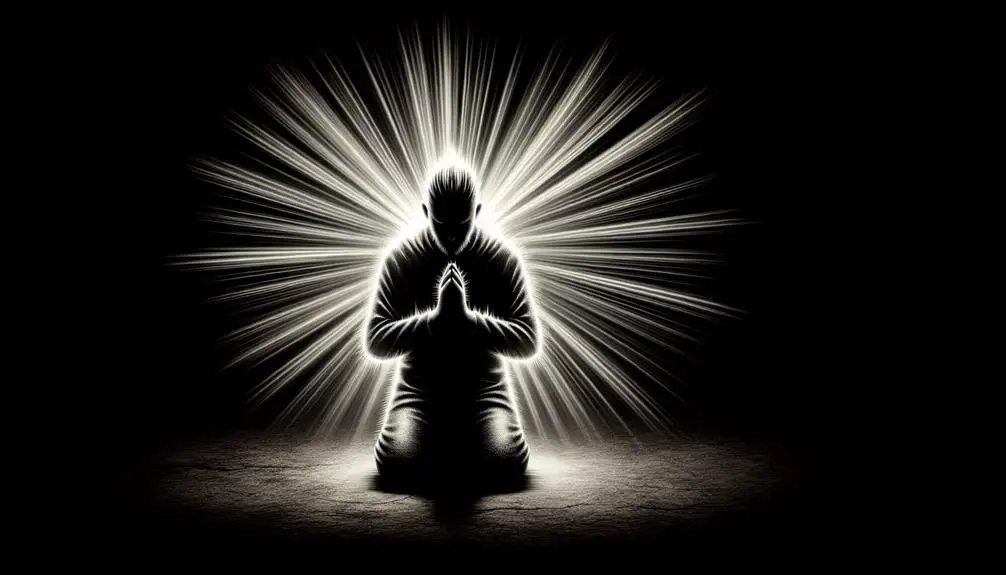Discover why merely believing in God isn't enough, as we delve into the chilling implications of 'Even the Devil Believes in God.

Even the Devil Believes in God Bible Verse
A surprising 90% of people say they believe in some form of a higher power, yet James 2:19 points out that even demons believe in God, and they shudder.
You might find yourself wondering what sets apart the belief professed by many from the trembling acknowledgment of the devil. This verse isn't just a commentary on the existence of God but a profound insight into the nature of belief itself.
As we explore the distinction between demonic faith and true faith, you're invited to reflect on what it means for your spiritual life and how to live beyond mere acknowledgment of the divine.
Key Takeaways
- Belief in God alone is not sufficient for true faith; actions reflecting that belief are essential.
- Demonic faith is characterized by fear and lacks a genuine spiritual connection or submission to God.
- True faith is evidenced by trust, love, and a deep, transformative relationship with the divine.
- The distinction between mere belief and true faith is crucial in living out a faith that impacts daily life and decisions.
Unpacking James 2:19

In dissecting James 2:19, we uncover that the acknowledgment of God's existence, even by demons, serves as a stark reminder of the distinction between mere belief and faith that manifests in actions. This pivotal verse challenges you to delve deeper into faith semantics, urging a reevaluation of what constitutes genuine faith. Unlike superficial belief, James posits that authentic faith is demonstrable and transformative, extending beyond mere intellectual assent.
Historical interpretations of this passage have consistently emphasized the insufficiency of belief without ethical living. Scholars argue that James isn't merely making a theological statement; he's advocating for a lived faith, one that's visible in acts of compassion and justice. This interpretation aligns with broader biblical narratives that prioritize deeds as evidence of faith.
The emphasis on faith semantics in James 2:19 invites you to contemplate the depth of your own beliefs. Are they passive acknowledgments or do they spur you into action? The historical lens further enriches this exploration, connecting you to a lineage of believers who've wrestled with similar questions. James challenges not just your understanding of faith, but your commitment to embody it.
The Nature of Belief

Delving into the nature of belief, it's crucial to understand that it's not merely an intellectual acknowledgment but a conviction that demands action and reflection. This concept goes beyond mere acceptance; it's a deep-seated assurance that influences behavior and outlook. When exploring belief origins and faith manifestations, it's evident that belief encompasses a complex interplay of cognitive, emotional, and volitional components. It's not static but dynamic, evolving with experience and reflection.
- Belief origins often stem from cultural, familial, or personal experiences, shaping an individual's worldview.
- Faith manifestations can vary widely, from private practices to communal expressions, reflecting the diversity of belief systems.
- The sincerity of belief is demonstrated through actions, not just words, highlighting the importance of lived faith.
- Challenges and doubts can strengthen belief, fostering a deeper understanding and commitment.
- True belief influences moral and ethical decisions, guiding individuals in their daily lives.
Understanding the multifaceted nature of belief encourages a deeper exploration of one's convictions and their implications for life. It's a journey of discovery, commitment, and transformation, deeply personal yet universally relevant.
Demonic Faith Vs. True Faith

Exploring the concept of belief further, we now confront the stark contrast between demonic faith and true faith, a distinction that challenges our understanding of the essence and depth of conviction. Demonic faith, exemplified through Satanic pacts, represents a belief system rooted not in love or reverence, but rather in fear and transaction. It's a faith based on fear, where adherence is driven not by devotion but by the dread of consequences or the allure of promised power. This form of belief acknowledges the divine's existence yet lacks any semblance of genuine spiritual connection or submission to a higher moral order.
True faith, in contrast, is characterized by a profound, personal relationship with the divine, marked by trust, love, and a voluntary submission to God's will. It transcends mere acknowledgment of existence, embodying a heartfelt commitment to live according to divine principles. Unlike the fear-based faith of demonic agreements, true faith is liberating, offering peace and fulfillment through a deep, enduring bond with the divine. This fundamental difference highlights not just a divergent approach to belief, but a contrasting understanding of the nature and purpose of faith itself.
Implications for Spiritual Life

Understanding the distinction between demonic faith and true faith reveals profound implications for one's spiritual life, emphasizing the transformative power of a genuine connection with the divine. This understanding isn't merely academic; it's foundational to navigating the complexities of spiritual warfare and recognizing God's omnipresence in your life.
Here are some key considerations:
- Awareness of spiritual warfare: Realizing that belief alone isn't indicative of a deep, saving faith helps you to be more vigilant in your spiritual journey, acknowledging the ongoing battle for souls.
- Appreciation for God's omnipresence: Understanding that even demons believe in God—and shudder—can deepen your appreciation for God's omnipresence and His ultimate authority over all creation.
- Motivation for authentic transformation: This knowledge serves as a stark reminder that true faith must go beyond mere belief, driving you towards a more authentic, transformative relationship with God.
- Discernment in spiritual practices: It encourages you to examine your spiritual practices critically, ensuring they foster a genuine connection with the divine, rather than a superficial acknowledgment of God's existence.
- Strengthened spiritual defense: Recognizing the difference between demonic faith and true faith equips you with the tools to strengthen your spiritual defenses, preparing you to stand firm against spiritual deception.
In essence, grasping the implications of this distinction enriches your spiritual life, guiding you towards a more profound, lived experience of faith.
Living Beyond Mere Belief

Having established the profound difference between demonic faith and true faith, it's crucial you now consider how to embody a faith that transcends mere belief. This leap from belief to action signifies the maturation of your spiritual journey. Faith actions, as distinct from mere acknowledgment of divine existence, mark the frontier where genuine transformation begins.
Delving into belief depth, it's apparent that true faith isn't static; it propels you towards living out the principles you profess to believe. This dynamic expression of faith is critical, as it differentiates living faith from the inert acknowledgment demons exhibit. Faith, in its essence, demands action—it's an active, living thing that influences how you interact with the world and the decisions you make daily.
To live beyond mere belief, then, is to integrate your faith into every aspect of your life, allowing it to shape your actions, decisions, and interactions. It's a holistic approach that encompasses not just what you believe, but how those beliefs are manifested in the tangible world. In essence, your faith actions and the depth of your belief are inextricably linked, each feeding into and strengthening the other, propelling you towards a fuller, more authentic expression of faith.
Frequently Asked Questions
How Has the Interpretation of 'Even the Devil Believes in God' Evolved Throughout Christian History, Particularly During Major Theological Shifts?
Throughout Christian history, your understanding of faith's nuances has been shaped by historical contexts and theological debates.
This phrase's interpretation has evolved, especially during significant theological shifts. Initially, it highlighted belief alone isn't sufficient for salvation—a concept debated during the Reformation.
Over time, it's been used to argue the importance of a lived faith, contrasting mere acknowledgment of God with true discipleship and transformation of the heart.
Can the Concept of 'Even the Devil Believes in God' Be Found in Religious Texts Outside of Christianity, and if So, How Is It Portrayed Differently?
You're diving into a sea of diverse beliefs, exploring how the concept of acknowledging a higher power transcends Christianity.
Islamic perspectives often portray jinn acknowledging Allah's supremacy, paralleling the Christian narrative, yet with unique nuances in their submission and rebellion stories.
Hindu interpretations, while more polytheistic, also hint at demons recognizing divine entities.
Analyzing these texts reveals a universal theme: even in defiance, acknowledgment of a greater power persists, painted with different cultural brushes.
In What Ways Has the Phrase 'Even the Devil Believes in God' Influenced Modern Popular Culture, Such as Literature, Movies, and Music?
You've likely noticed the phrase 'even the devil believes in God' permeating modern pop culture, from horror themes in movies to subtle nods in literature and music.
This idea, stripped of its biblical roots, serves as a rich vein for exploring the complexity of faith and morality.
Cultural references to this concept often challenge or reaffirm personal beliefs, illustrating the enduring impact of religious themes in shaping societal narratives and individual perceptions.
How Do Various Christian Denominations Differ in Their Understanding and Application of the Lessons From 'Even the Devil Believes in God' in Their Religious Practices and Beliefs?
You're navigating how denominations diverge in interpreting and embodying lessons within their practices and beliefs. This exploration reveals that denominational rituals and faith expression aren't monolithic.
Each tradition delves into these teachings, shaping distinct approaches to worship, doctrine, and daily living. It's a rich tapestry where the nuances of belief inform how communities engage with faith, highlighting a spectrum of understanding that's as varied as the denominations themselves.
What Psychological Implications Can Be Drawn From the Acknowledgment That Belief Alone, as Exemplified by the Devil, Is Insufficient for Salvation or Spiritual Fulfillment?
You might think it's all about belief, but it's not. Acknowledging belief as insufficient highlights a profound psychological truth. This understanding sparks cognitive dissonance, where mere belief clashes with the need for moral actions.
Analyzing this reveals that true spiritual fulfillment requires more than belief; it demands actions aligned with those beliefs. This insight challenges us to move beyond mere acknowledgment towards living out our beliefs through tangible, moral actions for true fulfillment.
Conclusion
In conclusion, acknowledging the existence of God, like demons do, doesn't equate to salvation. True faith involves transformation and commitment, unlike the mere intellectual assent of demonic belief.
Thus, your spiritual life must transcend simple acknowledgment; it requires active, living faith demonstrated through love and deeds.
The chasm between demonic faith and true faith is vast, bridged only by genuine, actionable belief. Therefore, live not just with the belief in God but let that belief sculpt your heart and actions.



Sign up